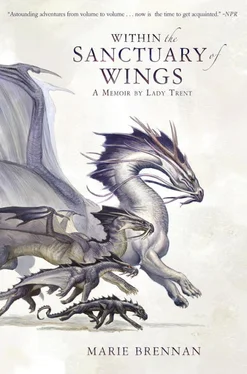His hands were shaking as he dragged his goggles loose. They disclosed a face as weathered as my own, and eyes spilling over with disbelieving tears. Though the wind tore the sound away, his lips shaped the words, “All praise to God.”
Nothing in my life has ever felt more like a miracle. I collapsed to my knees at his side; and we were still locked in embrace when Thu, descending with a great deal more care, arrived to witness our reunion.
* * *
The story came out in pieces, for neither of us was coherent enough to make it through more than half a sentence at a time.
Although my career has been built on a foundation of careful observation, I doubted the evidence of my own eyes. How could those two men be there? It was far too early in the spring for them to have returned to Tser-nga; for me to chance the heights at this date was ambitious, and possible only because I began from so nearby. Had I let myself dream of my companions’ return, I would have calculated it for a month hence.
The answer, of course, was that their departure point was equally close. Suhail and Thu had spent the winter in Hlamtse Rong—not because they were snowed in, as I had been, but because they refused to leave.
They had no expectation of my survival. But Suhail would not hear of leaving my body in the mountains; he was determined to wait until spring, and then comb the path of the avalanche until he found my remains and gave them a proper burial. To his mind, the only question was who would stay with him, and who would go to inform the Scirling army of my death and the results of our expedition.
All of my companions had survived. I went as limp as Suhail at that news; I could not have stood up for all the iron in the world. They had escaped the worst of the avalanche, faring much better than I did; but their attempts to find me in the aftermath had comprehensively failed, though they risked their lives in the search. Only the certainty that all four of them would die if they remained at the col had finally driven them down—and even at that, the other three had dragged Suhail away by main force. By the time the storm passed, there was no hope of finding me alive; and indeed, by then I would have been dead were it not for my Draconean rescuers. They returned to Hlamtse Rong in grief, and there agreed that Chendley and Tom would leave, while Suhail and Thu would stay.
Why that division? I did not ask immediately, though I did wonder. Chendley’s duties called him east, of course; and Suhail, as I have said, insisted on waiting for spring. To send Chendley off on his own would have been much too hazardous, and so he needed a companion. But why was it Tom who had gone, and not Thu?
The answer to that came later. In the meanwhile, they had a question of their own, to wit: how in God’s name had I survived?
I finally broke from my daze enough to look around. The sisters had not followed me in my uphill charge; that was hardly surprising. But what on earth could I possibly say to explain my presence here, if I could not point to a Draconean as the answer?
They must have conducted a rapid argument amongst themselves, while I was lost to the world in my own reunion. When I looked up, Ruzt was concealed among the rocks not far away, watching me with a steady eye. I met her gaze, and something passed between us. We were not sisters, to read one another’s minds through long familiarity; but we had built a rapport over the winter months, in which we learned to communicate by means both verbal and otherwise, and I knew what she was saying now.
With my heart beating so strongly I could taste my pulse upon my tongue, I nodded my agreement.
She stepped out from behind the rocks, standing tall in the sun. “There,” I said, my voice pleasingly steady. “There is the Draconean who saved my life.”
* * *
The side of a mountain above the snow line is not the best place to conduct an extended conversation. At some point during what followed, we agreed to retire to a more comfortable spot—still on the western side of the col.
Suhail and Thu had known for months that such organisms existed: humanoid bodies with draconic heads. And Suhail, of course, had both his archaeological knowledge and his familiarity with my draconic expertise to draw on in forming conclusions based on that fact; moreover, he had the entirety of a long Mrtyahaiman winter in which to contemplate the possibilities. But as I myself had discovered, it is one thing to find a frozen specimen, and quite another to meet the living cousin face to face. (Or rather three of them, as Kahhe and Zam had, with palpable reluctance, joined Ruzt in view.)
I could scarcely tear my gaze away from my husband. Winter had left its marks upon him, as it had upon me. For many years his family had pressured him to become a prayer-leader; the colloquial phrase for this is “to grow one’s beard,” as Amaneen prayer-leaders do not shave their faces. I assumed Suhail was no more inclined to the religious life now than he had been, but he had at least grown his beard: a useful addition to the face in a Mrtyahaiman winter, though one I hoped he did not intend to keep. This, I eventually realized, was a source of some hilarity to Zam, who had found my own hair astonishing enough; she had not realized that the males of my species could grow it upon their chins as well.
But there was little hilarity in those initial moments, as we were all too busy reeling from our various shocks. Suhail’s own gaze kept alternating between me and the Draconeans, pulled this way and that by his dumbfounded relief on the one hand, and his astonished curiosity on the other. When I explained the situation to my caretakers, his expression took on the abstracted cast I knew so well; it was the look he bore when the greater part of his mind was devoted to efforts linguistic. “You were right,” I said to him, breaking off my explanation. “Their language is related to Lashon and Akhian. No doubt you’ll be more fluent than I am in a week.”
The complex tangle of languages caused no little difficulty. My Draconean companions were accustomed to hearing me mutter to myself in Akhian, but Scirling was wholly unfamiliar to them, and it made them nervous: to them it had the sound of a code, used so they could not hope to guess at what I was saying. But it was the only language Thu and I had in common; and he and Suhail still resorted to Yelangese on occasion, which they had used a great deal during their own winter sojourn. Together with Draconean, there were four languages tumbling around in our conversation, and matters often ground to halt while a concept was carried through the necessary chain of translations.
My first task was to explain to the sisters who these two men were. This went with relative ease, for they recalled my story of how I came to be in the Sanctuary—and I think that Ruzt and Kahhe at least were very glad to see my fears laid to rest, though Zam may not have cared overmuch. After that, however, I was peppered with questions from both sides: Why had Suhail and Thu come back? How many Draconeans were there? Were other humans coming over the col? Where had I lived all winter? Could the men be trusted not to speak of what they had found? Could they be permitted to see a Draconean city?
“Enough!” I exclaimed at last. I honestly cannot recall which language the word emerged in, but the meaning was clear to everyone. I pressed my hands to my aching head and tried to marshal my thoughts into order. Then I turned to the Draconeans and said, “You are safe for now; there are only two of them, though we should discuss what will happen next. But will you let me explain matters to them first? I think they are much more confused than you.”
Permission thus obtained, I began to direct the traffic of the conversation in a fashion that even I will admit was imperious and high-handed. It was the only way to retain my sanity, for individuals on both sides kept breaking in with new questions. By the time I had satisfied everyone’s initial curiosity to an acceptable degree, it was almost midday, and my throat was so dry I felt I could have swallowed all the snow on Gyaptse.
Читать дальше












